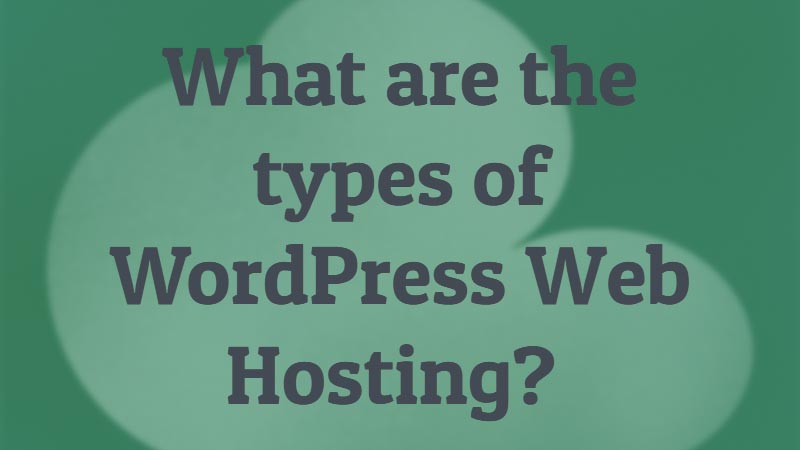Do you know that there are different types of WordPress Web Hosting that you can choose to create a blog or website?
As a WordPress beginner, choosing the right type of hosting for your WordPress site can be overwhelming. There are various types of hosting available, each with its own benefits and drawbacks. You can also find free web hosting services for your site but that won’t last longer if you are running a large business.
In this article, we’ll take a look at the most common types of WordPress web hosting for beginners and help you decide which one is right for your website.
What is Web Hosting?

Web hosting is a service that allows individuals or organizations to make their websites accessible on the Internet. To display a website on the internet, the website files must store on a computer that gets connected to the internet. In addition, it should be capable of serving those files to visitors who request them. Web hosting companies provide this service by renting out space on their servers. Such website files can be stored and accessed by visitors who type in the website’s URL.
Web hosting involves several components, including storage space for website files. Additionally, bandwidth for data transfer, email accounts, and other features is based on the hosting plan. Different types of hosting plans are available. These plans include shared hosting, dedicated hosting, and virtual private server (VPS) hosting. Each has its own advantages and disadvantages.
Shared hosting is the most affordable option, where many websites get hosted on a single server. Dedicated hosting, on the other hand, provides a single server exclusively for one website.
VPS hosting is a virtual private server where a physical server is divided into multiple virtual servers. Each of these can host a separate website. Cloud hosting uses many servers to host a website, providing greater scalability and reliability.
How to Choose a Good WordPress Web Hosting Service?

Choosing a good WordPress web hosting service is essential for the success of your website. Here are some factors to consider when choosing a hosting service:
- Uptime: A good hosting service should have high uptime, ideally 99.9% or more, which ensures that your website is accessible to visitors all the time.
- Speed: Your hosting service should have fast loading times, which can affect your website’s SEO and user experience.
- Security: Look for a hosting service that offers advanced security features. Some like SSL certificates, firewalls, and malware protection.
- Customer support: Your hosting service should offer good customer support, preferably 24/7, so you can get help whenever you need it.
- Cost: Consider the pricing of different hosting services and choose one that fits your budget.
- Scalability: Your hosting service should be able to handle traffic spikes and be scalable, so you can upgrade your plan as your website grows.
- WordPress integration: Look for a hosting service that specializes in WordPress hosting and offers one-click installation. Furthermore, it should have automatic updates and WordPress-specific features.
- Reputation: Read reviews. Check the hosting service’s reputation to ensure they have a good track record and satisfied customers.
By considering these factors, you can choose a hosting service that provides reliable and secure hosting for your WordPress website.
So without further ado, let’s check out different types of WordPress Web Hosting Services that you can use for your website.
Shared Hosting

Shared hosting is the most common type of hosting used by beginners. It involves hosting multiple websites on the same server and sharing its resources such as CPU, RAM, and storage. This type of hosting is usually the most affordable, making it an excellent option for those on a budget.
The downside to shared hosting is that your website shares resources with other websites on the same server. This can result in slower loading times, especially during peak traffic hours. Additionally, you have limited control over the server and software configurations. This makes it difficult to customize your website.
Shared hosting is often the most affordable option for small businesses, bloggers, and individuals. These are the people who don’t require a large number of server resources. The hosting provider manages the server and performs maintenance, security, and software updates. This makes it a hassle-free option for those who don’t have technical expertise.
But, shared hosting also has its limitations. Since resources include sharing, if one website on the server experiences a sudden surge in traffic, it can affect the performance of other websites hosted on the same server. Additionally, shared hosting plans may have limited storage space. In addition to that, bandwidth, and other resources, can hinder the growth of a website that requires more resources.
Overall, shared hosting is a good option for those who are starting out and don’t need a lot of resources or technical expertise. As a website grows, it may be necessary to upgrade to a more powerful hosting plan or a dedicated server to meet the growing demands of the website.
Managed WordPress Hosting

Managed WordPress hosting is a type of hosting that is specifically designed for WordPress websites. It provides users with a hosting environment that includes optimization for WordPress. With features such as automatic updates, security monitoring, and backups. Managed WordPress hosting is more expensive than shared hosting. Yet it offers better performance and security.
It also provides better support for WordPress. They come with knowledgeable support staff who can help you with any WordPress-related issues. Additionally, this hosting provides more control over your website’s server and software configurations. This allows you to customize your website to your liking.
Managed WordPress hosting providers typically offer a range of features and benefits, such as:
- Optimized performance: Managed WordPress hosting providers use various caching techniques. In addition, it includes CDNs and server optimization to ensure fast loading times and high website performance.
- Enhanced security: It takes care of various security measures. Features like malware scanning, security patches, and proactive monitoring. This ensures that your website is safe from cyber threats.
- Automatic backups: Managed WordPress hosting providers offer daily or weekly backups of the website. This is to ensure that data is protected in case of any unexpected issues.
- One-click staging environments: The ability to create a staging environment helps users test updates and changes before going live, reducing the risk of breaking the live website.
- 24/7 support: Managed WordPress hosting providers offer dedicated support for WordPress websites, with experts available 24/7 to assist with any issues.
In conclusion, managed WordPress hosting is a good option for WordPress website owners who want to focus on their business and content creation while leaving the technical details to experts.
Virtual Private Server (VPS) Hosting

Virtual private server (VPS) hosting is a type of hosting that involves hosting multiple websites on a single physical server, but each website has its own virtual server with dedicated resources such as CPU, RAM, and storage. This type of hosting provides better performance and reliability than shared hosting, making it a popular choice for websites that need more resources.
VPS hosting is more expensive than shared hosting but less expensive than dedicated hosting. It provides users with more control over their server configurations, allowing them to customize their website’s software and settings. Additionally, VPS hosting provides better security than shared hosting, as each website is isolated from the others on the same server.
Some benefits of VPS hosting include:
- Scalability: VPS hosting allows for easy scalability, allowing users to increase or decrease resources such as RAM, CPU, and storage as needed.
- Customizability: Each VPS can be customized with its own set of software applications and operating systems, providing more flexibility than shared hosting.
- Security: Since each VPS operates independently, there is less risk of security breaches affecting other virtual servers on the same physical server.
- Cost-effective: VPS hosting provides the benefits of a dedicated server at a lower cost, making it a cost-effective solution for businesses and individuals.
Finally, VPS hosting provides a good balance between the affordability of shared hosting and the power of dedicated hosting, making it a popular choice for businesses and individuals who need more control and flexibility over their hosting environment.
Dedicated Hosting

Dedicated hosting is a type of hosting that involves hosting a single website on a dedicated server. This type of hosting provides the most resources, performance, and reliability, making it a popular choice for high-traffic websites and online businesses.
Dedicated hosting is the most expensive type of hosting, but it provides users with complete control over their server configurations, allowing them to customize their website’s software and settings. Additionally, dedicated hosting provides the highest level of security, as there are no other websites on the same server to compromise your website’s security.
Dedicated hosting provides a high level of performance and security as the client has exclusive access to the server’s resources. It is particularly useful for websites or applications that require a lot of resources, such as high-traffic websites, large e-commerce sites, or applications that process large amounts of data.
With dedicated hosting, clients can choose their own hardware specifications, operating system, and software, which provides a high degree of flexibility and customization. They can also install their own security measures to protect their data and the server from unauthorized access.
Cloud Hosting

Cloud hosting is a type of web hosting service that allows websites and applications to get hosted on virtual servers that are pulled from a large network of physical servers. This type of hosting provides better performance, scalability, and reliability, making it an excellent choice for websites that need to handle large amounts of traffic.
Cloud hosting is more expensive than shared hosting but less expensive than dedicated hosting. It provides users with more control over their server configurations, allowing them to customize their website’s software and settings. Additionally, cloud hosting provides better security than shared hosting, as it uses multiple servers to ensure that your website stays up and running even if one server fails.
With cloud hosting, resources such as processing power, memory, and storage can be easily scaled up or down as needed. This provides the ability to handle fluctuations in website traffic or application usage without the need for dedicated hardware. This can make cloud hosting a more cost-effective solution compared to traditional hosting methods.
Cloud hosting providers offer a range of plans with different levels of resources and customization options. Some providers may also offer additional features such as automatic backups, load balancing, and security measures to ensure the reliability and security of the hosted websites and applications.
Conclusion
In conclusion, there are several types of hosting options available for websites, including free hosting services but each has its own benefits and drawbacks.
Shared hosting is a cost-effective option suitable for small websites with low traffic.
VPS hosting is a good choice for websites that require more resources and control than shared hosting but are not yet ready for dedicated hosting.
Dedicated hosting is a high-performance option that provides full control and customization for websites with high traffic and resource demands.
Cloud hosting offers scalability and flexibility by utilizing multiple servers and is suitable for websites with fluctuating traffic and resource demands.
Lastly, managed hosting is a specialized option where the hosting provider takes care of all the technical aspects of hosting. This allows website owners to focus on their business operations.
Choosing the right hosting option depends on the website’s specific needs, budget, and level of technical expertise.
Now over to you,
Which type of WordPress Web Hosting service you are choosing for your website?
What type of WordPress web hosting service do you recommend for small businesses?
Please let us know your thoughts and follow us on Facebook and Twitter.
